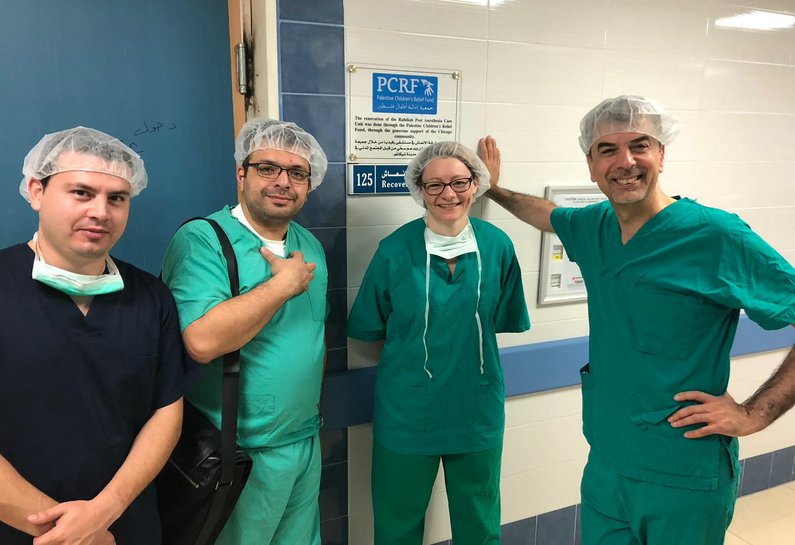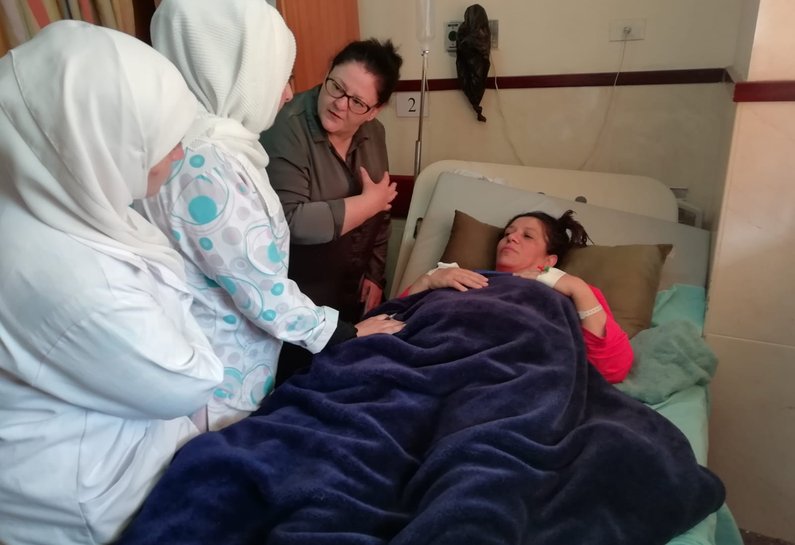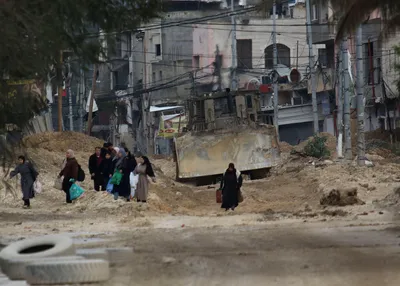Following six UK breast cancer specialists in the West Bank

Palestinian women with breast cancer face numerous challenges to accessing continuous and effective medical care. Though the disease is now one of the best understood and most treatable forms of cancer, survival rates for women affected by breast cancer in the occupied Palestinian territory (oPt) are low.
Throughout the week-long mission, the UK medics worked alongside local health workers to help improve the care Palestinian women with breast cancer receive. The team comprised of specialist breast cancer nurse, Michelle Johnson, two radiologists, Janet Litherland and Anthony Maxwell, and three breast cancer surgeons, Jane Macaskill, Ahmed Mustafa and Yazan Masannat.

Day one- Developments in Palestinian breast cancer care
The week began with the visiting medics learning about the latest developments in Palestinian breast cancer care, since the last MAP-supported mission back in May.
Dr. Asad Ramlawi, Deputy Minister of Health, hosted a meeting which was attended by surgeons and radiologists from Rafidia Hospital and Watani Hospital Cancer Clinic Day Care Centre in Nablus, and Beit Jala Hospital, which recently opened a breast cancer clinic.
The group discussed the opening of two new breast cancer clinics, as well as the recently opened unit in Beit Jala. They reflected how to apply multi-disciplinary team (MDT) working, whereby patients with breast cancer are cared for by a team of healthcare professionals, each with their own expertise. This is strong principle of cancer care in the UK and was promoted and demonstrated by the UK specialists throughout the week.
Day two- Breast cancer diagnosis at Rafidia Hospital, Nablus
Leaving Ramallah, the UK medics travelled to the north of the West Bank to visit Rafidia Hospital in Nablus.
The radiologists and surgeons attended an outpatient clinic, where they met patients with breast cancer and reviewed their diagnostic imaging, used to diagnose breast cancer and evaluate the stage and extent of disease.
They then attended an MDT meeting with the surgeons and radiologists from Rafidia Hospital. Together they reviewed the diagnoses of the patients seen and decided appropriate treatment plans. This allowed the diagnosis pathways to be reviewed and helped identify any unnecessary diagnostic imaging.
Day three- Teaching new surgical techniques and understanding breast cancer screening and radiotherapy barriers
Specialist breast cancer nurse, Michelle, and the radiologists visited Makhfiya Primary Health Centre (PHC) in Nablus, one of the only Ministry of Health PHC in the north of Palestine with mammography services for breast cancer screening. There the team identified opportunities to train the local radiographers in new diagnostic procedures.
UK Breast Cancer Nurse Specialist, Michelle Johnson, then spent the afternoon with local nurses at to the Watani Hospital Cancer Clinic Day Care Centre in Nablus. She met women with breast cancer receiving chemotherapy and heard about the challenges they face in accessing radiotherapy, an essential part of their treatment after surgery. Augusta Victoria Hospital in East Jerusalem is the only hospital in Palestine to provide radiotherapy. For these women, if their permit is granted by the Israeli authorities, this means an arduous journey of over two hours to reach East Jerusalem, and a long return journey, every day during their radiotherapy treatment.
At Rafidia Hospital, the three visiting surgeons operated on four breast cancer patients alongside the local surgeons. They used a technique not previously used at the hospital, a ‘sentinel node biopsy’, to assess if the cancer had spread to lymph glands through a limited axillary (armpit) operation. MAP provided the local surgical team with supplies of the patent blue dye so they can continue to use this new technique.
Day four- Ward rounds and promoting multi-disciplinary team (MDT) working
Nurse Michelle and the surgeons attended a ward round at Rafidia hospital to see how the patients were doing after their surgeries. They advised the patients on post-surgery care, including exercises to reduce the risk of uncomfortable complications such as lymphedema.
The UK team then ran an educational symposium for local health workers to promote the principles of MDT working. Radiologist Janet gave a presentation outlining the factors contributing towards successful MDTs. The UK medics conducted mock-MDTs on two cases using breast imaging, to demonstrate the need for input from each member of the MDT to achieve robust evidence-based decision making on the patients diagnosis and treatment.
MAP would like to thank Michelle, Janet, Anthony, Jane, Ahmed and Yazan for their hard work and energy last week, helping to develop Palestinian breast cancer care.
Take action
This Breast Cancer Awareness Month, MAP is encouraging supporters to write to their MP, to call for action from the UK Government to address the needs of Palestinian women affected by breast cancer.
Related content


